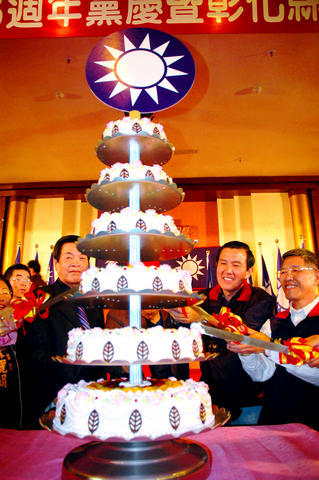Chinese Nationalist Party (KMT) presidential candidate Ma Ying-jeou (
The maternity leave could be taken by either the mother or the father, Ma said in Changhua, adding that unemployed parents would receive a NT$5,000 child care subsidy every month for two years.
"Men have long been the decision-makers in the country and tended to draft policies from a male perspective," Ma said.

PHOTO: CNA
"The KMT will take women's views into consideration when drafting policies after we regain power," he said.
Ma condemned President Chen Shui-bian (
Ma said he would focus on fighting the top three threats against women in Taiwan: domestic violence, sexual assault and sexual harassment.
A group of Democratic Progressive Party (DPP) Changhua County female councilors, however, staged a protest against Ma's visit, saying he was not qualified to discuss women's policies.
Ignoring the protest, Ma said he would tackle violence against women and children by increasing prison terms by as much as 50 percent and implementing stricter standards on granting parole for sex offenders.
He also said he would push for the establishment of a "family law" and improving professional standards in the handling of family matters in court.
If elected, Ma said he would implement all the provisions in the Gender Equality Employment Law (
To create a friendlier environment for career women, Ma said his administration would provide employment subsidies for women to encourage participation in the job market, which could create more than 100,000 jobs over the next four years.
Ma also promised to allocate NT$1 billion (US$30 million) annually and provide each qualified candidate with a NT$1 million loan with zero-interest to help women start their own business.
The right to work in a friendly and fair environment should also be extended to foreign brides, Ma said, pledging to relax limits on the employment of foreign brides and crack down on discrimination or inhumane treatment.
To protect the rights of female caregivers or housekeepers, the KMT presidential candidate also proposed establishing a "caregiver service law" (家事服務法) that would give a clearer definition of terms of employment.

Taiwanese scientists have engineered plants that can capture about 50 percent more carbon dioxide and produce more than twice as many seeds as unmodified plants, a breakthrough they hope could one day help mitigate global warming and grow more food staples such as rice. If applied to major food crops, the new system could cut carbon emissions and raise yields “without additional equipment or labor costs,” Academia Sinica researcher and lead author the study Lu Kuan-jen (呂冠箴) said. Academia Sinica president James Liao (廖俊智) said that as humans emit 9.6 billion tonnes of carbon dioxide compared with the 220 billion tonnes absorbed

The Taipei Mass Rapid Transit (MRT) Wanda-Zhonghe Line is 81.7 percent complete, with public opening targeted for the end of 2027, New Taipei City Mayor Hou You-yi (侯友宜) said today. Surrounding roads are to be open to the public by the end of next year, Hou said during an inspection of construction progress. The 9.5km line, featuring nine underground stations and one depot, is expected to connect Chiang Kai-shek Memorial Hall Station to Chukuang Station in New Taipei City’s Jhonghe District (中和). All 18 tunnels for the line are complete, while the main structures of the stations and depot are mostly finished, he

Taipei is to implement widespread road closures around Taipei 101 on Friday to make way for large crowds during the Double Ten National Day celebration, the Taipei Department of Transportation said. A four-minute fireworks display is to be launched from the skyscraper, along with a performance by 500 drones flying in formation above the nearby Nanshan A21 site, starting at 10pm. Vehicle restrictions would occur in phases, they said. From 5pm to 9pm, inner lanes of Songshou Road between Taipei City Hall and Taipei 101 are to be closed, with only the outer lanes remaining open. Between 9pm and 9:40pm, the section is

China’s plan to deploy a new hypersonic ballistic missile at a Chinese People’s Liberation Army Rocket Force (PLARF) base near Taiwan likely targets US airbases and ships in the western Pacific, but it would also present new threats to Taiwan, defense experts said. The New York Times — citing a US Department of Defense report from last year on China’s military power — on Monday reported in an article titled “The missiles threatening Taiwan” that China has stockpiled 3,500 missiles, 1.5 times more than four years earlier. Although it is unclear how many of those missiles were targeting Taiwan, the newspaper reported